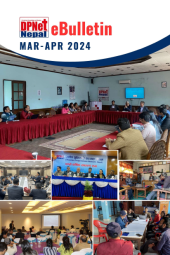March-April, 2024 DPNet ebulletin
Summary
This e-bulletin highlights DPNet's comprehensive efforts in advancing disaster preparedness, response, and resilience through a series of activities and discussions, each focusing on critical aspects such as humanitarian standards, climate change, and disaster risk reduction from March to April 2024. On March 11, 2024, DPNet facilitated a session on the localization of the Core Humanitarian Standard (CHS) and Sphere Standards within Nepal. This discussion not only highlighted the revisions made to the CHS but also provided a platform for sharing experiences and strategies for implementing these standards effectively at the local level.
Subsequently, on March 14, a virtual program was held to deliberate on the draft Climate Change Act. This gathering engaged stakeholders to provide feedback, aiming to refine and strengthen the draft legislation. This was a step in enhancing Nepal’s legislative framework to better address the challenges posed by climate change. The momentum continued with DPNet's 15th General Assembly on March 15, convened in Kathmandu. This event was marked by deep discussions around disaster risk reduction and the pivotal role of early warning systems. The assembly was also significant for the election of a new executive committee in the leadership of Dr. Raju Thapa, ensuring continued leadership and dedication in the field of disaster management. The assembly further recognized various contributions to disaster risk reduction, awarding individuals and entities for their exceptional efforts.
Post-earthquake recovery and reconstruction were another major focus, with multiple programs discussing the ongoing challenges in these areas. These discussions highlighted the slow pace of reconstruction and the need for housing solutions tailored to the specific contexts of affected areas. Emphasis was placed on the importance of community involvement in rebuilding efforts, ensuring that reconstruction strategies are inclusive and effectively meet the needs of all stakeholders. Moreover, a discussion on March 5th stressed the importance of strengthening disaster communication through media. This program highlighted the media’s critical role in disaster risk reduction, especially in light of the increasing impacts of heatwaves. Proactive and anticipatory actions were discussed as essential responses to forecasted heatwaves, emphasizing the need for timely and effective communication to mitigate potential impacts.
Additionally, insights from recent fire incidents were shared, with discussions emphasizing the urgent need for improved firefighting resources, better preparedness, and enhanced community engagement in fire management. This is particularly crucial for mitigating the adverse effects of fires on lives, assets, and the environment. Collectively, these activities and discussions reflect DPNet Nepal’s ongoing commitment to enhancing disaster preparedness, response, and resilience across the nation. Through these engagements, DPNet continues to play a crucial role in shaping policies, enhancing community capacities, and fostering a culture of preparedness and proactive response to disasters in Nepal.
Categories:
DPNet Publication
Sub-Categories:
Ebulletin
Publisher:
DPNet Nepal
Published Year:
2024
